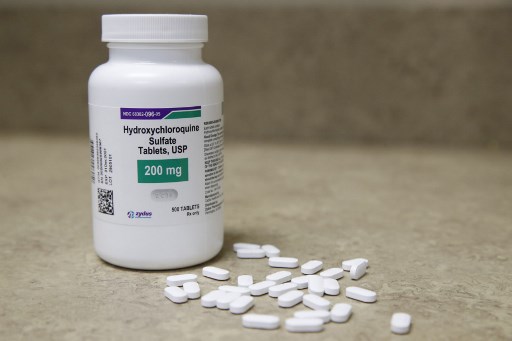
by Nina LARSON
Agence France Presse
GENEVA, Switzerland (AFP) — The World Health Organization said on Monday it had temporarily suspended clinical trials of hydroxychloroquine as a potential treatment for coronavirus.
The decision came after a study published in The Lancet medical journal last week suggested the drug could increase the risk of death among COVID-19 patients, WHO chief Tedros Adhanom Ghebreyesus told a virtual press conference.
Tedros said the executive group of the so-called Solidarity Trial, in which hundreds of hospitals across the world have enrolled patients to test several possible treatments for the novel coronavirus, had suspended trials using that drug as a precaution.
“The Executive Group has implemented a temporary pause of the hydroxychloroquine arm within the Solidarity Trial while the safety data is reviewed by the Data Safety Monitoring Board,” Tedros said.
“The other arms of the trial are continuing.”
Hydroxychloroquine is normally used to treat arthritis but public figures including US President Donald Trump have backed the drug as a virus treatment, prompting governments to bulk buy.
Trump said last week he was taking the drug as a preventative measure, but in an interview aired on Sunday on Sinclair Broadcasting he said he had completed his course.
“Finished, just finished,” Trump said. “And by the way, I’m still here. To the best of my knowledge, here I am.”
Brazil’s health minister also recommended last week using hydroxychloroquine, as well as the anti-malarial chloroquine, to treat even mild COVID-19 cases.
The Lancet study found that both drugs could produce potentially serious side effects, particularly heart arrhythmia.
And neither drug helped patients hospitalised with COVID-19, according to the study, which looked at the records of 96,000 patients across hundreds of hospitals.
Tedros said both drugs were generally safe for patients with autoimmune diseases or malaria.
WHO chief scientist Soumya Swaminathan told Monday’s briefing the Solidarity Trial had been looking only at the effects of hydroxychloroquine and not chloroquine.
The decision to suspend enrolment for trials using hydroxychloroquine was “a temporary measure”, she said.
– ‘Dangerous assumption’ –
The COVID-19 pandemic, which began late last year in China, has killed nearly 350,000 people worldwide and infected almost 5.5 million, according to an AFP tally using official sources.
While there is still no approved treatment or vaccine, drastic measures that at one point saw half of humanity under lockdown have pushed down transmission rates in several countries.
As many nations begin to gradually lift restrictions, the WHO stressed the need to maintain physical distancing and to scale up efforts to test and detect cases.
“All countries need to remain on high alert,” WHO expert Maria Van Kerkhove said.
“The virus will take the opportunity to amplify if it can.”
WHO emergencies chief Michael Ryan warned against the idea that the pandemic might move in seasonal waves.
“Making an assumption that it is on a downward trajectory, and the next danger point is some time in October or November, I think that would be a dangerous assumption,” he said.
© Agence France-Presse







